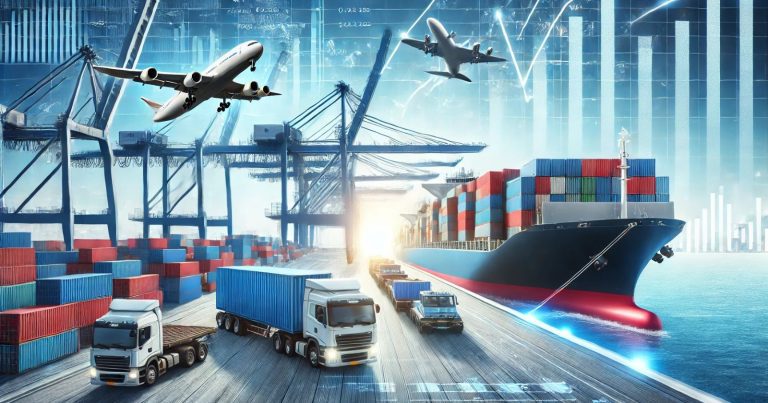International trade (or foreign trade) is the exchange of goods and services between different countries. Foreign trade, which is the widest concept, has both advantages and disadvantages. The advantages and disadvantages of foreign trade significantly influence the overall economic disposition. Foreign trade allows nations to specialize in production. It creates larger but more segmented markets that, in turn, create added value to the economy. Trade also has disadvantages, like dependence on foreign economies, trade imbalances, and vulnerability. Optimal foreign trade ensures good things for one country and bad for another. Hence, businesses and policymakers must understand foreign trade types and their influence.
What is Foreign Trade?
Foreign trade is buying and selling of goods, services and capital between countries. It helps countries import the products they do not have and export them with a surplus. As it ensures better resource utilization. Foreign trade, stimulates economic activities through job creation, enhancing production, and industrialization. Foreign trade differs from foreign investment, in which capital moves across borders.
Features of Foreign Trade
The characteristics of foreign trade set it apart from domestic trade and affect world economic relations. The involvement of several nations, physical exchange of goods and services with foreign currency, etc.
- Involvement of multiple nations: Foreign trade links together producers, consumers, and traders of countries. It opens global market access for businesses. International expansion allows companies to increase sales and be a part of growth outside of their home markets.
- Localization of Goods and Services: Nations will export surplus goods and tend to import products as required. This ensures that balance and stability are achieved in the economy through this exchange. It guarantees that nations have access to essential resources, providing the crucial foundation for industrial development and consumer choice.
- Foreign Exchange and Currency Transactions: Trade involves the exchange of currency rates, as different nations use different currencies. A good foreign trade policy makes sure that transactions run smoothly. Stable exchange rates are beneficial in that they help businesses plan international trade deals with reduced financial risks.
- Trade Agreements and Policies: International organizations, such as the World Trade Organization (WTO), govern trade between countries. Countries enter into trade agreements to lower tariffs and build cooperation. These treaties promote free trade, support diplomatic relations, and offer new business opportunities.
- Reliance on Global Market Dynamics: Import export is impacted by inflation, currency fluctuations, and geopolitical events. Stable political conditions enhance trade relations. Strong global demand and stable economic conditions enhance trade and foster business growth.
Types of Foreign Trade
Specialization can also take place between countries in foreign trade. Vertical divisions include import and export trade and entrepot trade that promotes economic development, resource complementarity and international business expansion.
Import Trade
Imports of commodities Exports of goods and services Imports of goods and services. Countries import goods they can’t provide domestically, cannot afford to manufacture, or are of higher quality if produced abroad. Combining this trade fills gaps in resources, access to technology, and consumer choices. India, for example, imports crude oil from Saudi Arabia and gold from Switzerland to feed its energy and jewelry industries. Import trade is pivotal in fostering economic growth, driving industrialization, and elevating a nation’s living standards.
Export Trade
Export trade is selling domestically produced goods and services to other countries. It encourages business growth in different countries, earning foreign exchange and boosting a nation’s economy. Production increases, jobs are created, and the trade balance improves through exports. Many sectors expand by exporting commodities to global markets, increasing brand awareness, and driving profits. For instance, India’s exports of textiles, spices, and software services make these industries critical to the country’s economic success. Industrial development and global business expansion thrive on a strong export trade.
Entrepot Trade (Re-Export Trade)
Goods imported from a country and processed/repackaged/refined before being exported to another country come under entrepot trade (also called re-export trade). This form of trading is prevalent in global commercial centers like Singapore, Hong Kong and Dubai, where companies capitalize on advantageous locations and trading networks. Emulative: Singapore, for example, buys crude oil and refines it, then sells petroleum products to others. Entrepot trade increases the efficiency of global trade, creates jobs, and makes nations the leading global trade hubs.
Advantages of Foreign Trade
Foreign trade offers numerous benefits for businesses and economies. Foreign trade drives economic progress, but it also has some disadvantages that countries must manage carefully.
Economic Growth and Industrial Development
Foreign trade is the main means of expanding industries and providing inputs for further economic growth through increased demand for goods and services. This allows countries to build robust manufacturing and export industries. It creates additional jobs and better income as trade increases. Sectors expand, bringing in capital, new technology, and educated labor, fortifying a country’s economy. A growing trade sector boosts GPD, lowers poverty, and increases the standard of living.
Specialization and Increased Efficiency
Foreign trade enables countries to focus on producing certain goods and services in which they have comparative advantages, boosting efficiency and productivity. Countries, therefore, are better able to increase the quality of the product, reduce the production cost, and allocate the resources used efficiently. In national markets, specialization increases the competitiveness of industries on a global scale, helping the country gain a reputation for superior quality. They also push businesses to innovate and adopt better production techniques to stay competitive.
Access to New Markets
Foreign trade allows businesses to sell their goods and services worldwide, boosting revenue and business growth. Businesses can access a wider customer base globally, fostering less reliance on domestic markets and enhancing financial stability. Climate change demands global attention and cross-sector partnerships to achieve success. Scaling globally enables businesses to pivot seamlessly between market demand and the economy.
Availability of Resources and Technology
Foreign trade allows nations to import high technology, machinery, and raw materials for up-gradation of production. Nations would rely heavily on overseas investments and their technical know-how, which would help embed robust industries in developing countries. With access to modern technology, production also increased faster with more quality and efficiency, which helped the firms to satisfy consumer demand. Thus, areas that practice international trade can keep this information up to date and enrich their industrial capabilities.
Competitive Pricing and Consumer Benefits
International affairs of foreign trade led to international competition among manufacturers, which led to a decrease in price and improved the quality of their products. Consumers are shielded from the negative effects of cartelization, as they have access to a wide variety of goods and services at reasonable prices, which boosts their purchasing power. In a competitive global market, businesses aim to attract customers by providing better quality and new types of products. Trade gives us access to international companies and niche items, improving the quality of goods available to each of us.
Strengthening Diplomatic Relations
By promoting economic interdependence, international trade helps countries create peaceful relationships and cooperate. Improving trade relations decreases political tensions and promotes stability. Strong trade relations can pave the way for better diplomatic ties, promote cultural exchange and build long-term relationships between nations. Countries dependent on one another for trade are likelier to cooperate and settle their disputes amicably.
Foreign Exchange Earnings
In addition to generating foreign currency reserves, it aids in reinforcing the economy by trading goods and services in foreign markets. A nation that imports less than it exports (trade surplus) becomes wealthier, and the economy grows. Foreign exchange earnings enhance the value of a country’s currency, increase government revenue, and aid infrastructure development. That means a strong trade balance contributes to lower inflation levels, gives the economy more stability, and draws in even more investment from abroad.
Disadvantages of Foreign Trade
Foreign trade has some benefits but also risks and challenges. This corrosiveness manifests often; countries must elevate foreign trade policy towards the greatest economic growth at the least sustainable cost by eliminating these disadvantages.
Dependence on Foreign Markets
Excessive importation and foreign dependence can leave the country prone to economic crises and long-term supply chain disruptions. When a country relies on imports for basic needs food, fuel, and technology, a global squeeze raises prices and cuts supplies. When the international market declines, local industries may be affected, causing a decrease in job opportunities and economic instability. Manufacturers need balance, and imports must be combined with local production for long-term economic security.
Risk of Dumping
The sale of those goods at discounted rates, known as dumping, leads to the cracking down of local enterprises as foreign entities penetrate the market with global technology. It creates erosion of competition, less profit and the closing of small industries. Most nations use anti-dumping duties and trade barriers to protect their markets. Dumping, in the absence of appropriate regulations, leads to job losses, erodes local manufacturing and turns the nation dependent on foreign goods. Governments must have strict trade policies in place to avoid economic bias from any unfair practices by trading entities.
Adverse Effects on Domestic Industries
Benefit from foreign trade poses fierce competition to small and medium-sized corporations with a tough time sustaining their presence in front of huge multinational firms. The surge in the importation of cheaper commodities can affect domestic produce and employment growth and might impede the speed of industrial expansion. As local industries fall in bad times, the economy loses its ability to support itself and becomes more reliant on imports, raising the risks for many businesses. Local businesses also deserve protection, but governments must invest in their domestic industries, support innovation, and intelligently liberalize imports.
Trade Deficits and Economic Instability
A trade deficit is when a country imports more goods and services than exports, which is considered financially unsustainable. Prolonged trade deficits erode foreign exchange reserves, raise national debt, and slow growth. Nations with chronic trade deficits find it challenging to maintain the value of their currency and entice foreign investments. Therefore, to help mitigate trade deficits, countries need to incentivize exports, modernize production processes, and craft effective trade policies to equalize international trade.
Political and Trade Restrictions
Trade policies that involve tariffs, quotas, and sanctions impact international trade and business growth. Political disputes between countries may restrict market access, raise the costs of imports, and create dislocation of trading relations. However, when countries implement tough restrictions on trade, it becomes difficult for businesses to expand globally and compete properly. Strong political stability and diplomatic relations are key to seamless International trade, investment opportunities and economic growth.
Currency Fluctuations and Inflation
The exchange rate is a determining factor for foreign trade and directly influences import and export prices. The volatility of currency values over time can lead to inflation, decreased purchasing power, and economic uncertainty. A weak currency drives up the cost of imports, raising the prices of everyday necessities. In contrast, when inflation suddenly hits the consumer’s pocket and reduces spending to slow down the economy. Rather, a country must manage its monetary policies to add such skills to its economy without putting its currency at risk.
Foreign Trade FAQs
What is the distinction between foreign trade and foreign investment?
Foreign Trade is the exchange of goods and services by one country to another and foreign investments mean investing capital in foreign-based companies or investments.
What are the major types of international trade?
Foreign trade can be of many types: import trade, export trade and entrepot trade (also known as re-export trade).
Why is foreign trade beneficial to India?
Thus, foreign trade in India supports export earnings, employment generation, and high-technology imports. It also further solidifies global economic relationships.
What are the three main challenges of Foreign trade?
Foreign trade faces trade imbalance, political instability, inflation, dumping, and high import dependence.
What is the function of the Indian Institute of Foreign Trade (IIFT)?
The Indian Institute of Foreign Trade (IIFT) was established in 1963 to provide education, training, and research in international business and foreign trade policies to the country for its economic growth.


